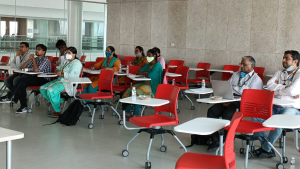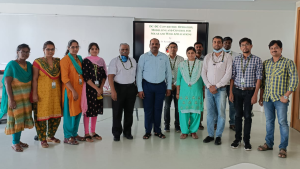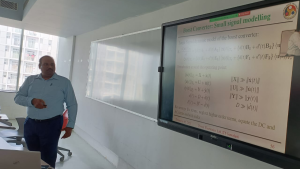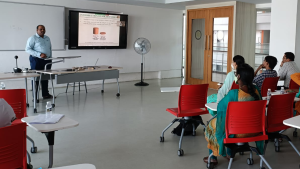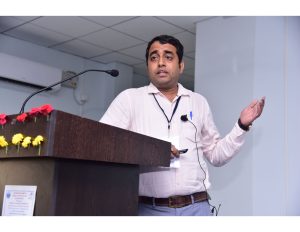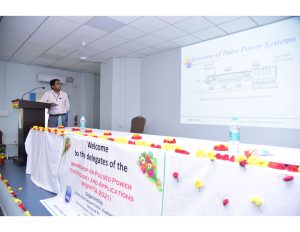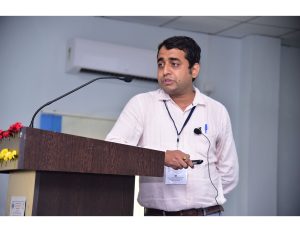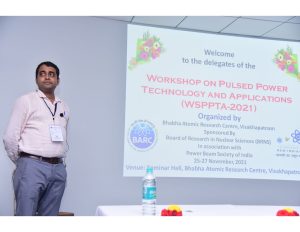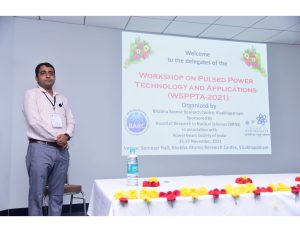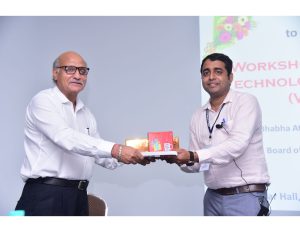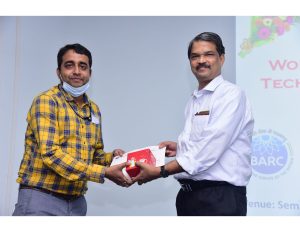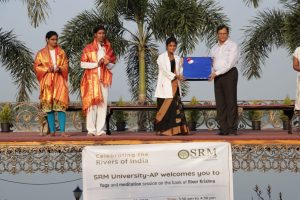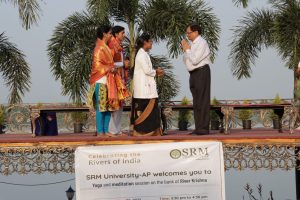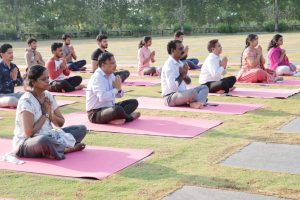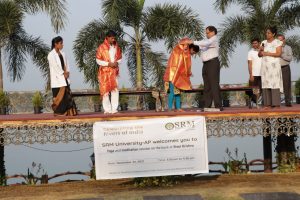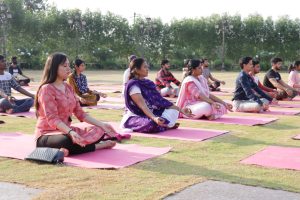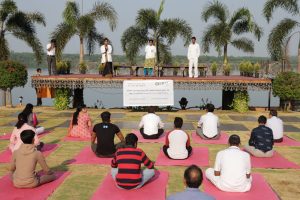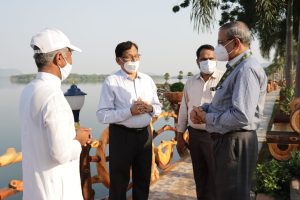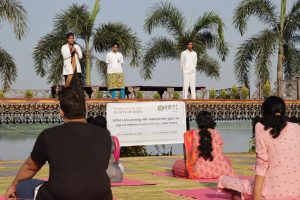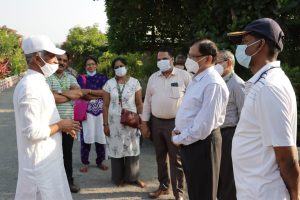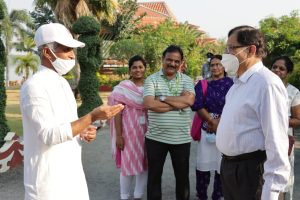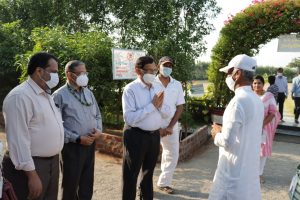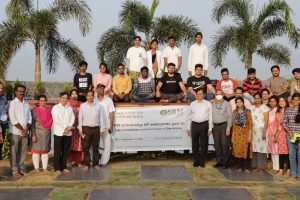SRM-AP All News
ALL News
- Efficient algorithms for dualisation problem for subclasses of Boolean functions December 29, 2021
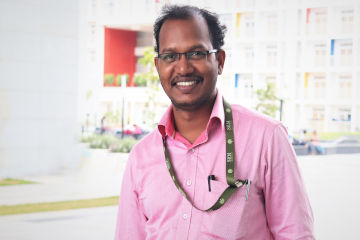 SERB-DST projects aim to build up the best systems that would match the best global practices in the area of promotion and funding of basic research. Dr Murali Krishna Enduri, Assistant Professor, Department of Computer Science Engineering at SRM University-AP is yet another faculty member who has obtained a project with a total outlay of ₹18 lacs for a duration of three years. The project is sanctioned under the scheme of Teachers Associateship for Research Excellence (TARE) of SERB-DST, Government of India.
SERB-DST projects aim to build up the best systems that would match the best global practices in the area of promotion and funding of basic research. Dr Murali Krishna Enduri, Assistant Professor, Department of Computer Science Engineering at SRM University-AP is yet another faculty member who has obtained a project with a total outlay of ₹18 lacs for a duration of three years. The project is sanctioned under the scheme of Teachers Associateship for Research Excellence (TARE) of SERB-DST, Government of India.In the duality theory, the dual problem is the problem of checking the duality of a pair of monotone Boolean expressions in disjunctive normal form. Problem: DUAL Input: The complete DNF of two monotone Boolean functions, f and g. Output: If f is dual of g. Whether the problem DUAL admits a polynomial-time algorithm has been one of the challenging open problems in the field of Duality theory of Boolean function for the last 35 years. It is one of the few problems whose polynomial-time solvability is still unknown. So, this problem is important in complexity theory due to its unknown complexity status and it plays a central role in various applications arising in computational logic, data mining, reliability theory, artificial intelligence and game theory etc. The project goal is to solve the dual problem for an interesting class of Boolean functions. Improving the existing complexity results of the DUAL problem for a particular class of Boolean functions is a challenging task.
Few applications of the project are as follows:
Type error diagnosis: Type error diagnosis is the task of generating an explanation for some error. It requires finding all minimal unsatisfiable subsets of a given set of constraints (representing the error) which can be managed via solving the computational variant of Dual in its minimal transversal formulation.Computational medicine: Optimal vaccination strategies are given a subset of initially infected individuals from a population of individuals and assumptions about disease transmission. The task of computing inclusion minimal vaccination strategies can be solved using the computational variant of Dual in its transversal hypergraph formulation.
The project will be carried out in collaboration with IIT Madras (Dr Jayalal Sarma, Associate Professor, Department of Computer Science & Engineering, Indian Institute of Technology Madras, Chennai, India.)
Continue reading → - Dynamic economic and emission dispatch with renewable energy integration December 28, 2021
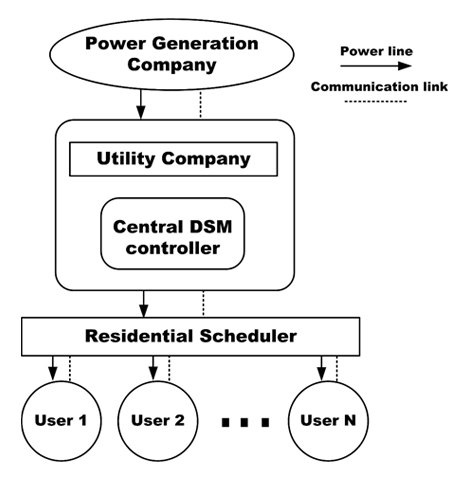 Nowadays, the energy demand of the present electrical power industry is increasing exponentially, and most of the electricity production depends on fossil fuel resources. A research paper titled “Dynamic Economic and Emission Dispatch with Renewable Energy Integration Under Uncertainties and Demand Side Management”, published by Dr B Lokeshgupta, Assistant Professor, Department of Electrical and Electronics Engineering, SRM University-AP, Andhra Pradesh, answers some of the pertinent questions regarding reducing the environmental pollution level.
Nowadays, the energy demand of the present electrical power industry is increasing exponentially, and most of the electricity production depends on fossil fuel resources. A research paper titled “Dynamic Economic and Emission Dispatch with Renewable Energy Integration Under Uncertainties and Demand Side Management”, published by Dr B Lokeshgupta, Assistant Professor, Department of Electrical and Electronics Engineering, SRM University-AP, Andhra Pradesh, answers some of the pertinent questions regarding reducing the environmental pollution level.Integration of renewable energy resources (RERs) along with demand-side management (DSM) is almost inevitable in the present scenario to meet the growing energy demand with minimum environmental pollution. This work proposes a combined model of dynamic economic and emission dispatch (DEED) and DSM to integrate renewable energy resources (RERs). In this analysis, the DSM load-shifting scheme is incorporated with the DEED problem to obtain the generation side operational benefits as well as the reduction in environmental pollution level. In this study, various smart home appliances and their complex constraints are included in the DSM load shifting process. The variability and stochastic nature of the load demand and RERs such as solar, wind are modelled with Normal, Beta, and Weibull distribution functions, respectively. The proposed model is implemented in both deterministic and stochastic approaches with the help of the non-dominated sorting genetic algorithm (NSGA-II) and the Monte Carlo Simulation (MCS) approach. In the stochastic model, the MCS approach appropriately handles the uncertainties of system load demand and RERs. Four different case studies are carried out in the simulation analysis to show the impacts of RERs and DSM integration on the traditional DEED problem.
Meeting the excessive energy demand with the minimum environmental pollution is a challenging task. The integration of RERs such as wind and solar into the grid is one of the superior solutions for this issue. However, the variability and uncertainty of the RERs bring challenges to the power system operation. Energy management schemes such as demand-side management (DSM) methods can help the power industry address the challenges of RERs integration. That is why the combination of renewable energy integration and DSM is one of the key solutions in the smart grid environment to meet the increased energy demand with the lowest possible energy cost and minimum pollution level. The RERs and DSM combination gives several financial, environmental, and technical benefits to the power industry along with a better system operation.
The dynamic economic and emission dispatch (DEED) is one of the widely adopted tools in the operation and planning of power systems. Both DEED and DSM are the essential tools in the smart grid environment for efficient energy management with the concern of economic and environmental aspects. The DEED’s primary task is to obtain the optimal scheduling of generators with minimum cost and emission for the given load demand. At the same time, the DSM’s primary goal is to improve the optimal values of system objective functions by shifting or managing the controllable loads of consumers. This work introduces a combined stochastic optimisation model of DEED and DSM scheme with the integration of solar and wind energy to show how DSM and RERs bring benefits to a generation company, and also to get better optimal operation cost and emission values simultaneously. The DSM load-shifting scheme is implemented in this study with the help of 10,000 active residential consumers. The effectiveness of the proposed combined model has been tested on a system of six thermal generating units, one wind-powered generator, and one solar-powered generator. The MCS approach and NSGA-II method are used in this paper to solve the proposed stochastic combined DEED and DSM optimisation model.
From the overall analysis, it is recognized that the implementation of the DSM load-shifting scheme along with RERs integration is essential for future smart grids to improve the financial savings of generation companies as well as to reduce the environmental pollution level. The paper is written in collaboration with Dr S Sivasubramani, Associate Professor, Department of Electrical Engineering, Indian Institute of Technology, Patna.
In future, the proposed DSM optimisation can be extended with the inclusion of a neighbourhood power-sharing model in the environment of multiple smart home consumers and prosumers. The proposed DSM model can also be integrated with the distribution network planning and operation problems to enhance the financial and technical benefits of distribution companies.
Continue reading → - Guest Lecture on “DC-DC Converters: Operation, Modelling and Control for Solar and Wind Applications” December 27, 2021
The Department of Electrical and Electronics Engineering at SRM University-AP organized a guest lecture titled “DC-DC Converters: Operation, Modelling and Control for Solar and Wind Applications” on December 3, 2021, at 11.00 am IST as part of the Departmental Lecture Series.
An eminent resource person, Dr. Ravindranath Adda, Assistant Professor, Department of Electrical and Electronics Engineering, IIT Guwahati, delivered the intriguing talk as the guest lecture. Many undergraduate students of EEE, research scholars and faculty members of SRM University-AP attended the riveting session.
In his lecture, Dr Adda discussed about the importance of DC-DC converters for solar PV and Wind power applications and emphasized the different non-isolated and isolated converter topologies. He also explained the output power variation of the solar PV or wind turbine as a function of weather conditions, and hence the requirement of DC-DC converters and storage systems to transfer the energy from non-conventional energy sources.
Finally, he discussed about the research scope of DC-DC converters, to increase gain, expedite efficiency, reduce the bulk, dynamic modelling, and large scale and small-scale modelling of DC-DC converters.
The lecture concluded with an energetic note with all the participants looking forward to putting to use all the knowledge and information that they had acquired because of it.
Continue reading → - Invited talk at Workshop on Pulse Power Technology and Applications (WSPPTA-2021) December 24, 2021
Dr Somesh Vinayak Tewari delivered an invited talk on “High Power Closing Switches” on November 25, 2021, during the Workshop on Pulse Power Technology and Applications (WSPPTA-2021) held from November 25, 2021, to November 27, 2021, at Bhabha Atomic Research Centre (BARC) Facility, Visakhapatnam, sponsored by Board of Research in Nuclear Sciences (BRNS), Department of Atomic Energy, Government of India in association with Power Beam Society of India.
The workshop served as a platform for pedagogical presentations, discussions on intricacies of pulsed power technology and mutual interactions among young researchers, engineers and students from academia and applied research laboratories and talks were delivered by scientists of BARC, IPR, DRDO, CEERI, professors from IIT, IISc and experts from industry.
Dr Tewari delivered a talk on “High Power Closing Switches”, highlighting the working principle, mechanism, and applications of vacuum switches like ignitron, thyratron, pseudo spark gap, gas-filled spark gap switches, liquid and solid dielectric switches, magnetic switches, and modern-day semiconductor switches.
After his talk, Dr Tewari was highly appreciated and felicitated by Dr D. C. Pande, Dr Raja Ramana Distinguished Fellow of DRDO. The proceedings were compiled in the form of book chapters and circulated to participants.
Continue reading → - SRM University-AP takes part in Celebrating the Rivers of India December 23, 2021
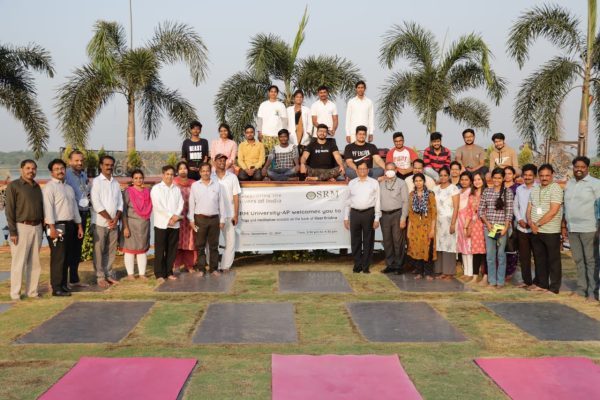 The students, faculty, and other staff members of SRM University-AP spent a memorable evening on the banks of River Krishna as a part of Celebrating the Rivers of India.
The students, faculty, and other staff members of SRM University-AP spent a memorable evening on the banks of River Krishna as a part of Celebrating the Rivers of India.As a part of Azadi ka Amrit Mahotsav, the Ministry of Jal Shakti, Government of India, organises various programmes on the theme Celebrating the Rivers of India. This revitalising excursion organised by the Department of Student Affairs at SRM AP was held in honour of the fourth largest river at Manthena Satyanarayana Arogyalayam, Thullur, Vijayawada.
Dr Manthena Satyanarayana introduced the gathering to the practice of naturopathic medicine which is based on modern and traditional, scientific, and empirical methods. Dr Gangadhar, Ms Chaitanya and Dr Prema led a short rejuvenating yoga and meditation session for the participants.
The practitioners at the Arogyalayam were honoured with stoles and mementos as tokens of appreciation. Dr R Premkumar-Registrar, Directors of various departments, and Deans of schools were present on the occasion.
Arogyalayam Research Centre advocates protecting health by increasing the level of immunity and enhancing life-force (praana sakti) amidst very pleasing natural environs, with the help of experts and experienced personnel, under the overall supervision of Dr Manthena Satyanarayana.
“The waterfront and the refreshing greenery of nature heals our mind and soul in this stressful modern-day life”, said Prof V S Rao, Vice-chancellor, SRM University-AP. The event, organised for Celebrating the Rivers of India, gave the participants an opportunity to unwind, relish the view of boats gliding smoothly on the river, enjoy the lush bushes growing all around, and do yoga in the delightful breeze with serene atmosphere.
Continue reading → - Dr Inbarasan Muniraj receives SERB-SRG-DST grant to improve low light imaging December 22, 2021
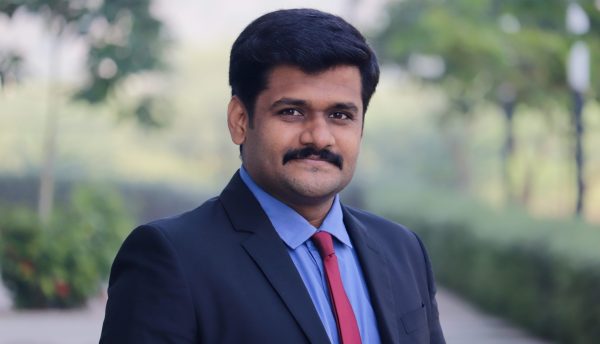 Imaging various three-dimensional (3D) objects under ultra-darkness is a fascinating process. However, our conventional cameras are not intelligent enough to capture the experience. Dr Inbarasan Muniraj, Assistant Professor in the Department of Electronics and Communications Engineering, is all about changing that.
Imaging various three-dimensional (3D) objects under ultra-darkness is a fascinating process. However, our conventional cameras are not intelligent enough to capture the experience. Dr Inbarasan Muniraj, Assistant Professor in the Department of Electronics and Communications Engineering, is all about changing that.Dr Inbarasan Muniraj’s project, “Sensing in the dark: An automated off-focused points detection and removal from the photons starved 3D volumetric dataset”, has received a SERB-SRG-DST of Rs. 20.8 lacs for a two-year duration.
Dr Muniraj describes his project as such,
“Assume that there is no external light, e.g., a dark room, when you capture an image using a camera (mobile or DSLR). Often, the captured images will look dark, and it is too difficult tointerpret anything from the picture. However, algorithms have been developed to make use of the low scattered photons from a scene to estimate the equivalent normal intensity image. We use one such technique to generate photons-counted images for a 3D object and perform a 3D image reconstruction. One of the major problems in 3D reconstruction is off-focused points which look blurry and redundant. Therefore, in this project, we aim to employ a deep learning technique to smartly recognise and remove the off-focused points from a reconstructed 3D scene under photons starved conditions.”
Dr Inbarasan Muniraj is the sole investigator of this project. According to him, there are much more extensive social implications associated with this project. To note, this technique can be extended for various applications such as night vision, security, and biomedical imaging etc.
- BSc Biology student to intern at Harvard Medical School December 21, 2021
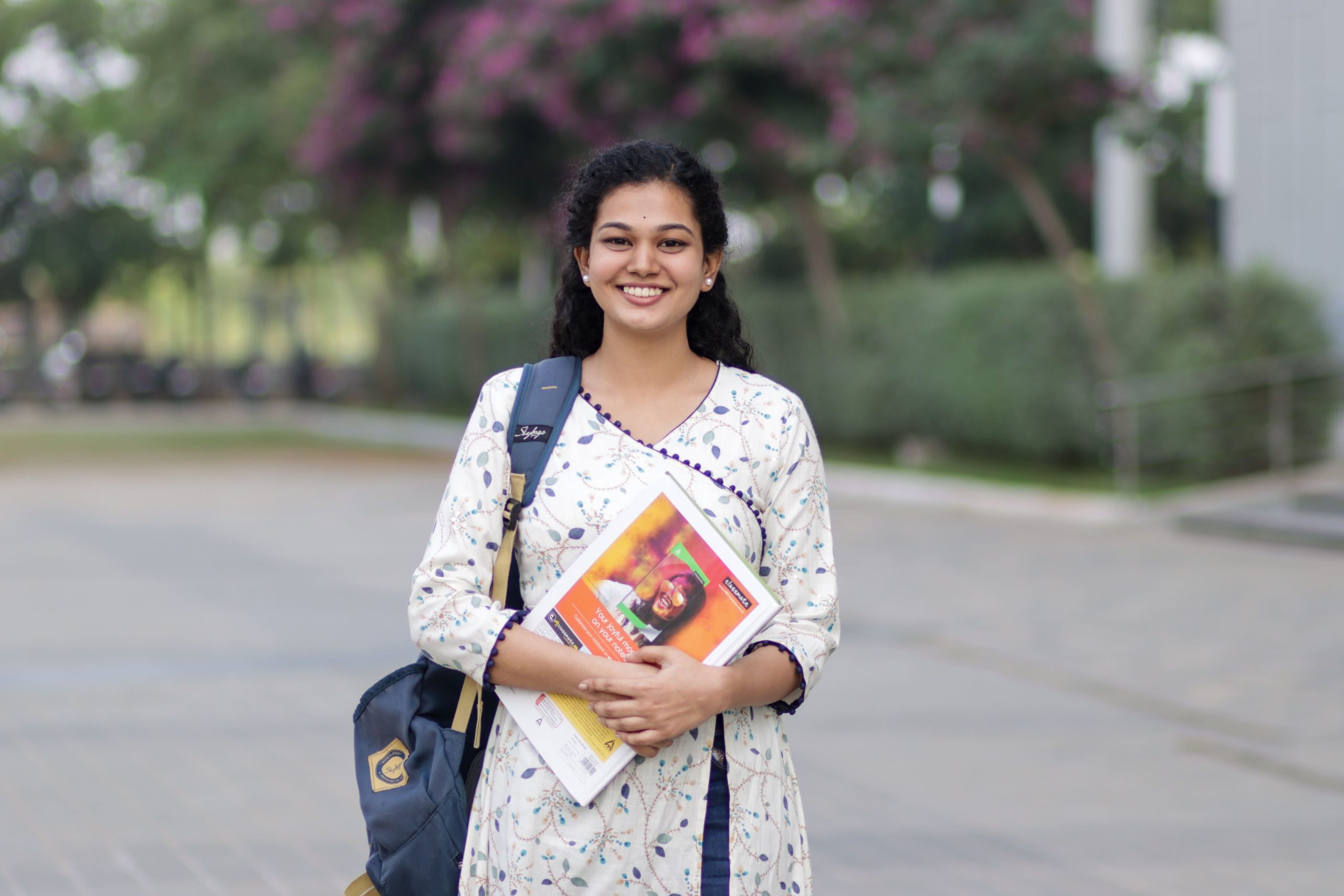 Rallapalli Bhavana Durga, a budding researcher from BSc Biology at SRM University-AP, earns an international internship at Harvard Medical School. The six-month internship will focus on bioengineering, cancer, and other biomedical research. The days at Harvard Medical School will impart an understanding of the development of cancer in an in-vitro model fabricated by the bioengineering approach.
Rallapalli Bhavana Durga, a budding researcher from BSc Biology at SRM University-AP, earns an international internship at Harvard Medical School. The six-month internship will focus on bioengineering, cancer, and other biomedical research. The days at Harvard Medical School will impart an understanding of the development of cancer in an in-vitro model fabricated by the bioengineering approach.The Office of International Relations and Higher Studies guided Ms Bhavana throughout the application process. Every eligible student who applies for study abroad programmes is given orientation and motivation to bridge the attainment gap. They share information about various research/internships/projects with interested students. Ms Bhavana qualified the eligibility criteria for Harvard Medical School, which focuses on Tissue engineering and other Biomedical engineering fields. After completing the screening, she received a welcome e-mail for the internship at Dr Shiladitya Sengupta & Haelin Jang’s lab in Brigham and Women’s Hospital, Harvard Medical School. During the internship period, she will be involved in i) research-related activities involving the hands-on discovery of new biological pathways in cancer metastasis and (ii) writing for publications.
“I have received a lot of support from my professors and Dr Swetha Pasupuleti, Associate Director, International Relations”, says Ms Bhavana. “From the beginning, all my professors have been very encouraging, and their suggestions and criticisms were constructive. Dr Swetha has been very supportive and reassuring during the application process, taking away my inhibitions. I feel excited about my internship”, she added.
To tackle barriers to postgraduate education, SRM University-AP has designed ambitious programmes that improve the admission of students to global institutions. International Relations and Higher Studies department ensure that all students and faculty on campus are supported and assisted in gaining access to resources in order to achieve the vision and mission of SRM University-AP in becoming a multidisciplinary global university.
Continue reading → - Dr Anil K. Suresh receives DBT grant for detoxifying sewage dyes at pilot scale December 17, 2021
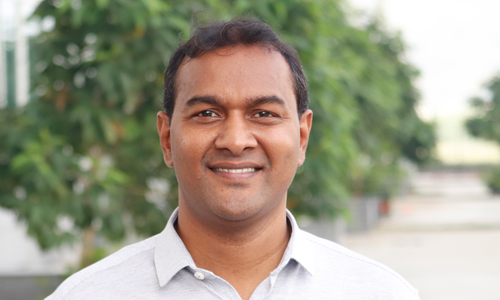 SRM University-AP is pleased to announce that Dr Anil K. Suresh, Associate Professor in the Department of Biological Sciences, has been awarded a DBT grant for his project entitled “Pilot-scale ultra-efficient fixative sewage dye-degradation by our ‘3D-megacatalyst’ generated using intact eggshell waste”.
SRM University-AP is pleased to announce that Dr Anil K. Suresh, Associate Professor in the Department of Biological Sciences, has been awarded a DBT grant for his project entitled “Pilot-scale ultra-efficient fixative sewage dye-degradation by our ‘3D-megacatalyst’ generated using intact eggshell waste”.About the Project:
Catalysis is widely used in various industrial and pharmaceutical processes to fasters the production of the desired end products. The use of inert matrices or frameworks is emerging as a “supported catalysts” arena with the potential for efficient reuse and recovery of the catalyst. We have recently generated a wide area supported catalyst utilising intact eggshell bio-waste, and the process is autogenic, facile, cost-efficient and entirely biodegradable. This supported megacatalyst can be effortlessly removed from the reaction by hand.
The current DBT-funding through Accelerated Translational Grant for Commercialization (ATGC) program is to support the technological reediness of our project for its commercialisation as a measure of Technology Readiness Level (TRL), an estimation technologies maturity and readiness for its utilisation in the commercial market. By demonstrating proof-of-concept laboratory studies, we are currently at TRL-6, and through this project, we will demonstrate pilot-scale studies for reaching the TRL-9 (Market/Operational level).
The main objectives of the proposal are:
1. Demonstrating large-volume degradations of sewage dyes at 500 L to 1000 Litres volume capacities in custom-built batch reactors.
2. Gram-scale hydrogenation of nitroarenes for the production of ~500 grams of pharmaceutical derivatives.
Social Implications of the project by Dr Anil K. Suresh:
Thousands of litres of harmful textile, paper sewage dyes that are corrosive and toxic to the environment and are unintendedly released can now be degraded into detoxified colourless by-products and water by using our “Au@megacatalyst”.
Pharmaceutically important precursors such as 4-aminophenol, propargyl amines can be produced in milligrams of quantities by using “Au@megacatalyst”, which otherwise are expensive and hard to synthesise. And most importantly, such precursors are currently being procured from China and other countries that can be avoided, and indigenous make-in-India can be conceptualised using our catalyst.
Dr Anil K. Suresh would be the principal investigator of this project, with a total outlay of Rs. 31 lacs over two years.
- CSE student wins Best Paper award and cash prize in International conference December 14, 2021
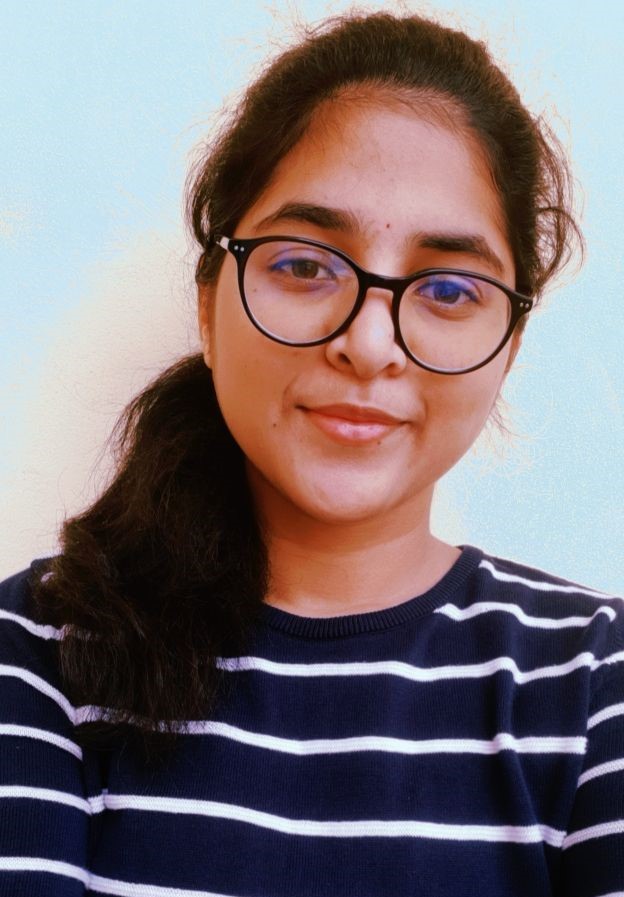 Padmaja Buggaveeti, an outstanding student from 3rd-year Computer Science Engineering at SRM University-AP, has won Best Paper (Third Prize) and a cash prize of Rs 10000 /- (Ten thousand rupees only) at the 4th ISEA Virtual International Conference on Security and Privacy 2021. Ms Padmaja, under the mentorship of her guide Dr V M Manikandan, presented a paper titled “A Novel Prediction Error Histogram Shifting-based Reversible Data Hiding Scheme for Medical Image Transmission” at the International Conference on Security and Privacy, sponsored by Information Security and Education Awareness Project Phase-II (ISEA-II) and organised by IIT (ISM) Dhanbad, India from October 27-30, 2021.
Padmaja Buggaveeti, an outstanding student from 3rd-year Computer Science Engineering at SRM University-AP, has won Best Paper (Third Prize) and a cash prize of Rs 10000 /- (Ten thousand rupees only) at the 4th ISEA Virtual International Conference on Security and Privacy 2021. Ms Padmaja, under the mentorship of her guide Dr V M Manikandan, presented a paper titled “A Novel Prediction Error Histogram Shifting-based Reversible Data Hiding Scheme for Medical Image Transmission” at the International Conference on Security and Privacy, sponsored by Information Security and Education Awareness Project Phase-II (ISEA-II) and organised by IIT (ISM) Dhanbad, India from October 27-30, 2021.Abstract: In this paper, Ms Padmaja proposed a new prediction error histogram shifting-based reversible data hiding scheme that ensures a high embedding rate and lossless image recovery. The pixels in the images are categorised into two different classes: white pixels and black pixels based on a checkerboard pattern. To predict the black pixel value for finding the prediction, they used the average of three pixels out of 4-neighbourhood pixels, which are very close to the central pixel value. The prediction error histogram is considered for further data hiding through the histogram shifting approach. An efficient overflow handling technique is used for this. The proposed algorithms were implemented using Matlab-2020, and the experimental study of the proposed scheme is carried out on the standard medical images and natural images.
International Conference on Security and Privacy is a premier conference focused on information security and privacy. This year’s conference was sponsored by Information security and Education Awareness Project Phase-II (ISEA-II) and organised by IIT (ISM) Dhanbad, India, from October 27-30, 2021.
Prize Details: Best Paper (Third Prize) and a cash prize of Rs. 10000 /- (Ten thousand rupees only).
Let’s hear what Ms Padmaja says about her achievement!
I thank Dr V M Manikandan, Assistant Professor in the Department of Computer Science and Engineering, for his valuable guidance in this research work. Winning the best paper award and cash prize in a reputed conference, ISEA-ISAP, has strikingly boosted my confidence to do research. I am grateful to all the faculty members of the CSE Department for their kind support and encouragement throughout my study at SRM University-AP.
Continue reading → - Cyber security enthusiast wins $1200 in Microsoft Bug Bounty Program December 10, 2021
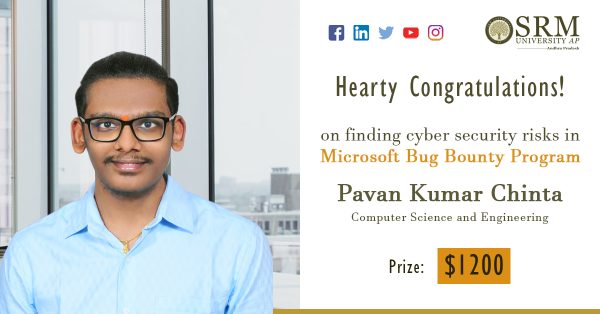 Taking your knowledge and solving real-world problems is the true intention of education. SRM University-AP is delighted to see Pavan Kumar Chinta achieve this aspiration and obtain $1200 Bounty from Microsoft Bug Bounty Program on November 13, 2021. The
Taking your knowledge and solving real-world problems is the true intention of education. SRM University-AP is delighted to see Pavan Kumar Chinta achieve this aspiration and obtain $1200 Bounty from Microsoft Bug Bounty Program on November 13, 2021. The
Bounty of $1200 was presented to Pavan by Mr Jason Pessemier, Microsoft Security Program Manager.Pavan Kumar Chinta has keen enthusiasm with Cyber Security as specialization in the Department of Computer Science and Engineering. Microsoft is not the only company that Pavan has managed to impress.
He has also reported Server-Side Request Forgery (SSRF) a high severity bug , in Mercedes Benz portal, and Groww by finding Broken Authentication and Security Misconfiguration. He was acknowledged by both the organisations and received swags from Groww.
Pavan has spared no space in his investigation of bugs. He was acknowledged by NCIIPC (A unit of NTRO), the Government of India, for discovering Sensitive Information Disclosure like PNR, Name, Mobile Number, etc., of the passengers in IRCTC’s authorised partner. He has also reported bug issues to GeeksforGeeks and Google.
Pavan expressed “Prof. T Ragunathan, (Associate Dean (Engineering) – School of Engineering and Sciences), guided me and encouraged to study the University’s Cyber Security structures as well. With constant guidance from Dr Priyanka, Assistant Professor, Computer Science Engineering, I was able to work with pentesting tools and develop reconnaissance methodologies. This lockdown helped me to discover and build myself. His short-term goal is to secure MAMAA (Meta, Apple, Microsoft, Amazon, and Google’s parent company, Alphabet).
This is an excellent start for a 3rd-year student. We hope to see the series of security risk investigations that began here to stay with him, and that he goes on to make tremendous achievements and makes the internet a safer space.
Continue reading →


